#name of the rose
Text
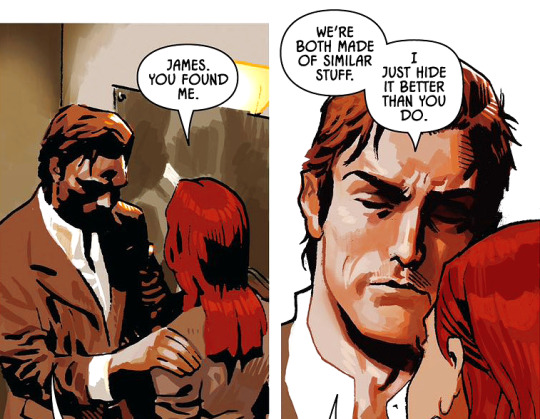
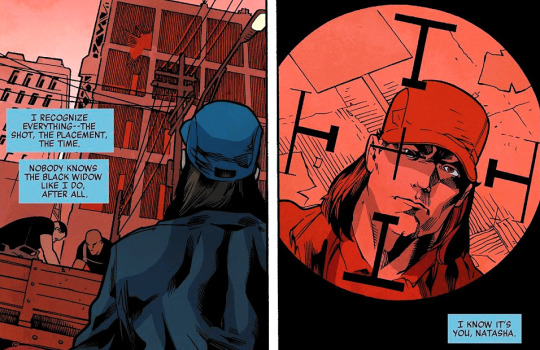

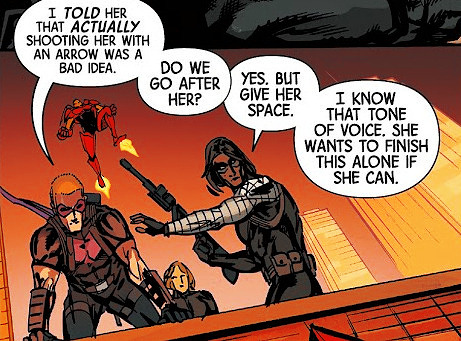

Bucky knowing Natasha better than anyone else:
Black Widow: Name of the Rose #4
Secret Empire Omega
Web of Black Widow #5
Black Widow (2020) #1
#comicedit#marveledit#buckynat#winterwidow#natasha romanoff#bucky barnes#name of the rose#web of black widow#secret empire#black widow 2020#panels#my edits
289 notes
·
View notes
Photo


The Name of the Rose (1986) | dir. Jean-Jacques Annaud
598 notes
·
View notes
Note
I'm really interested in hearing about the thought process behind Brother Guy not being the victim in the final version, as well as where his backstory we learn about in Act II might have come from. Considering Act II also introduces the Sommerfeld family, was there a background decision at some point of "hey, we need to acknowledge what is happening with Jewish people in this setting?" Is Guy's story and approach to everything going on meant to sort of contrast with the Sommerfeld's (i.e. Guy as a descendant of forced converts vs Rachel and Benjamin as Jewish people active within their community)?
This element of the game just really keeps sticking in my brain, and I'd love to learn more about what was discussed behind the scenes!
He was never intended to be the Act I victim. When working on prototypes, I try to approach them with the explicit declaration that everything we use will be thrown out. It doesn't mean we will throw everything out, but that needs to be the attitude.
Prototypes are built for effect rather than for establishing pipelines. I.e., the prototype is about creating an experience we can all agree on. The vertical slice expands that experience but builds it "the right way". Vertical slice content usually winds up in the game so it should not only be the experience that you want, but it should be built the way you expect to build (most of) the rest of the content.
If we lean too heavily on material we made in a prototype during our vertical slice, we may incur debt because those things may have been built badly, or oddly, or simply in a way that is different from everything else. So while we did use a lot of our prototype material in our vertical slice, the main quest itself was scrapped (as it was always intended to). The murder in Act I needed to fit into a larger narrative framework and Brother Guy's death wouldn't have worked for a variety of reasons.
Some spoilers below:
Cf. the murder of Adelmo in The Name of the Rose. The death of one monk, even under suspicious circumstances, is only of great concern to the abbot because the Papal delegation is arriving. The death of Baron Rothvogel is of great concern to Father Gernot due to his friendship with the Prince-Bishop of Freising.
As far as Guy's background, I thought it was important that the story addressed various things happening to Jews around Europe at the time. The early modern period was very turbulent for Jews and I thought that should be reflected, even if it was happening in side stories. His experience is not the experience of the Sommerfelds and his way of dealing with prejudices toward his ancestors is certainly unique.
We didn't want to make historical prejudices central to the identities of people in Tassing or Kiersau for the same reason we didn't delve deep into things like corporal spousal/child abuse (though characters like Franz and certainly Lenhardt are clearly emotionally abusive at least) even if that were quite common in the period. The topics are so severe that they would likely derail focus on the other plot and thematic elements. Characters like Vácslav also indicate there are background prejudices at play that keep him in the company of charcoal burners and executioners. Anyway, even if the people of Tassing and Kiersau had likely been indoctrinated with prejudices, they have bigger fish to fry, so to speak.
86 notes
·
View notes
Note
Do you have good recommendations of books/movies/ect that either do a particularly good job explaining certain facets of it (you mentioned Early Modern Catholicism recently, which was what got me thinking of this), or simply captures a vibe of the period in a way you think was particularly well-done?
Thanks!
Oooh like late medieval/early modern Catholicism/religious movements of the time (i.e., reformation)?
I think some of my favourites are:
Little Hours (film) - ok, so hear me out. Boccaccio would have LOVED the recent film interpretation of those stories of his (it's stories one and two from the third day, if I remember right. Been a while since I read the Decameron). It's modern in language, music, humour and incredibly pop-modern particularly. Yet the clothes and scenery etc. are all more or less of the late 14th century. Boccaccio, who wrote in the vernacular and enjoyed the bawdy and "common" entertainments of the day, would have been like "yes, you get it. you get what I'm doing" about it.
Just a fun, raunchy story of the late medieval era and it does capture some of the vibes~~.
(Story time: I got into an argument with one of the more curmudgeonly and pedantic historians I know irl and he was so against this movie and I was like "I'm sorry that you're wrong and Boccaccio's ghost is going to laugh at you but it is what it is I guess".)
Wolf Hall (book and show) - while I love the show, I recommend the books over it (for many reasons, not the least of which is: let Thomas Cromwell be fat). That said, if you're pressed for time or can't get into Hilary Mantel's writing style, the show is perfectly good.
She does a great job of capturing England in a state of change and the push pull of the early reformation. Cromwell is obviously of the Protestant persuasion but the dynamic, complicated quality of the average person's engagement with their faith and the Church is more or less captured. It's also just gorgeously written--very lush, you sink into her writing style, quite gorgeous. She also gets her historical details right, so that's a win.
(Unlike the movie Luther which is just like: Luther is always right, the Catholics are always wrong. The end.)
If you're a fan of Thomas More, he doesn't come the best in this, but you know - we are deep in an interior third person of Cromwell's brain so that informs the view of the world we are presented.
(There is a hilarious scene where Cromwell is trying to rally the troops to save More from himself and you get Cromwell, the Duke of Norfolk and a few others kneeling before Henry basically begging for mercy to be shown and it's so fucking funny. Bleak, heart breaking, but also funny.)
A Man for All Seasons (play and film) - and the famous play that Hilary Mantel is in direct conversation with! There's a good movie version of it that I was enamoured with for a time. It's very much a pro-Thomas More piece of writing, so take that for what it's worth. It does suffer a little from the Luther effect of Thomas More always being right and Cromwell and Cranmer and the others always being wrong (or, rather, Luther suffers from the A Man for All Seasons effect). But you know, it's still worth watching I think.
An Instance of the Finger Post (book) - a little later than the other pieces, this is set in the 17th century and is a great who-dunnit from three different perspectives, exploring the classic issue of an unreliable narrator. I remember feeling that it captured life in Oxford just post the Restoration quite well. Also we get some fun cameos from Locke, Boyle and others who were bopping around at that time. Two of the narrators are also known figures from Oxford in the 1660s.
Lent (book) - So, my main man Marsilio Ficino wrote that famous letter to the college of cardinals after Savonarola was executed describing Savonarola as a demon who didn't know he was a demon. Jo Walsh took that concept and ran.
Basically, we follow Savonarola (who is a demon that, at first, didn't realize he was a demon) as he gets stuck in this time loop where he has to keep reliving the last five(ish) years of his life until he manages to free himself from hell. It's like Ground Hog Day but in 15th century Florence.
I have questions around the mechanisms and theological implications of like...his birth, his childhood etc. but you know, don't let that ruin a fun read.
I will say, Lent is a sloooooow start. Like. very slow. I almost set it down and didn't pick it back up at first. It really hits its stride about halfway through. But, it's a fun look at 1480s and 90s Florence with Ficino, Mirandola, Poliziano, Lorenzo de' Medici for a hot minute before he dies etc.
My beef is 1: Piero Soderini, my boy, she did you dirty (tbf to Walsh, the book is from Savonarola's perspective and he and Soderini were not close, shall we say. I may, or may not be, biased); 2: Marsilio is present and we love that but there is no word on Cavalcanti. Not even mentioned in passing!; 3: some of the exposition is heavy handed and could have used some tightening up etc.; 4: Jo Walsh's use of the English for words like Prior etc. which she explains her motive for at the back of the book. I've still got quibbles with that choice, though I know that's a me-thing.
But if you want a novel that is a decent look at every day Catholicism in the early modern period, this is a good one.
Le Moine et la Sorcière (The Sorceress) (film) - a medieval French film from the 1980s that takes place in the 13th century and follows the arrival of a Dominican friar in a small southern French town investigating rumours of a sorceress. It's a delightfully weird piece that plays with the story of St. Guinefort (the dog saint!) as well as medieval faith healing and other local synchronistic practices that carried over from pre-Christianized France.
The whole exploration of local sainthood, where a figure is not formally determined to be a saint by the Church but local people venerate them and eventually they sort of are absorbed into the canon, is fantastic.
The friar, Etienne, is wonderfully drawn as a character. I do wish they had given the same treatment to Elda, the titular "sorceress". But it's still worth a watch if you can get your hands on it.
Name of the Rose (book and film) - an Umberto Eco classic! Another who-dunnit, but in a Medieval monastery in the 14th century. Absolutely worth reading - beautifully and intelligently written. Lots of back and forth on the different religious thoughts and movements of the time (some deemed heretical, others more just fringe things people were into).
William of Baskerville is the main detective figure but the story is told from the point of view of his acolyte Adso. It's got lots of gothic feeling to it with an isolated monastery, a labyrnthian library, murder, madness, sexual tensions and so on.
This is one of my favourite books (up there with Wolf Hall and Kate Zambreno's Heriones).
There is a movie version with Sean Connery and it's fun to watch but really, the book is worth it. 110% worth it.
Other good films/plays that I can think of off the top of my head (they're all more medieval but w/e):
Seventh Seal (film)
Becket (film and play)
Lion in Winter (film and play)
I hope this answers your question? (I mostly hope I got the time period roughly right! I know I veered heavily in medieval in some of the rec's but they're all gold and worth the time.)
Thank you so much for the ask! <3 <3
#ask#reply#film#books#recommendations#medieval#early modern#name of the rose#wolf hall#lent#a man for all seasons#an instance of the finger post#little hours#book recs#film recs
25 notes
·
View notes
Text
Can I be honest and say I hate Manara’s designs of the characters. I’m going to make an in depth review of the graphic novel at some point, but in the mean time. Adso jump scare.

15 notes
·
View notes
Text
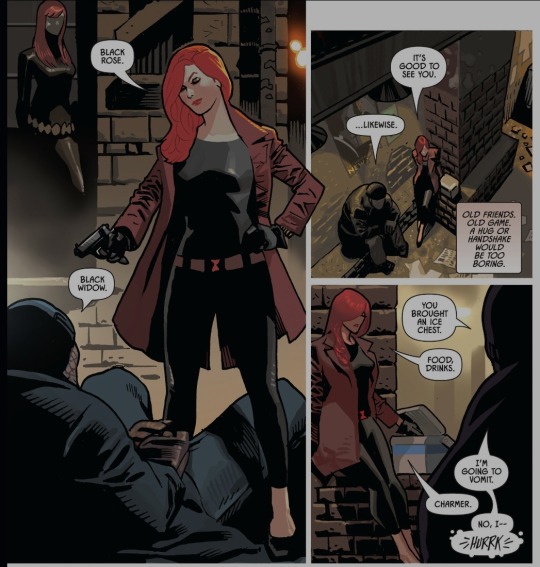


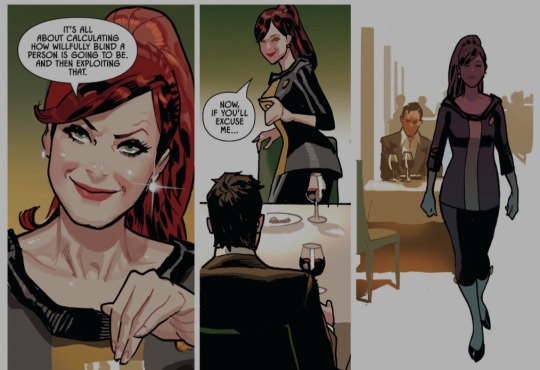
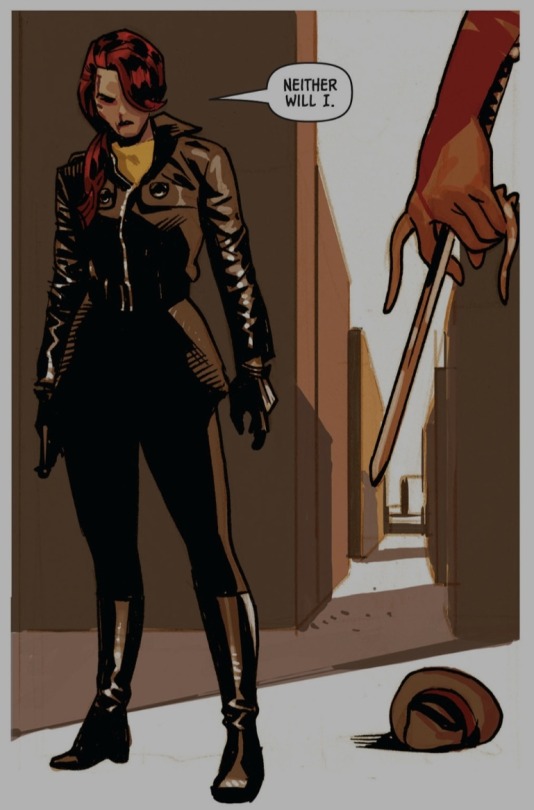
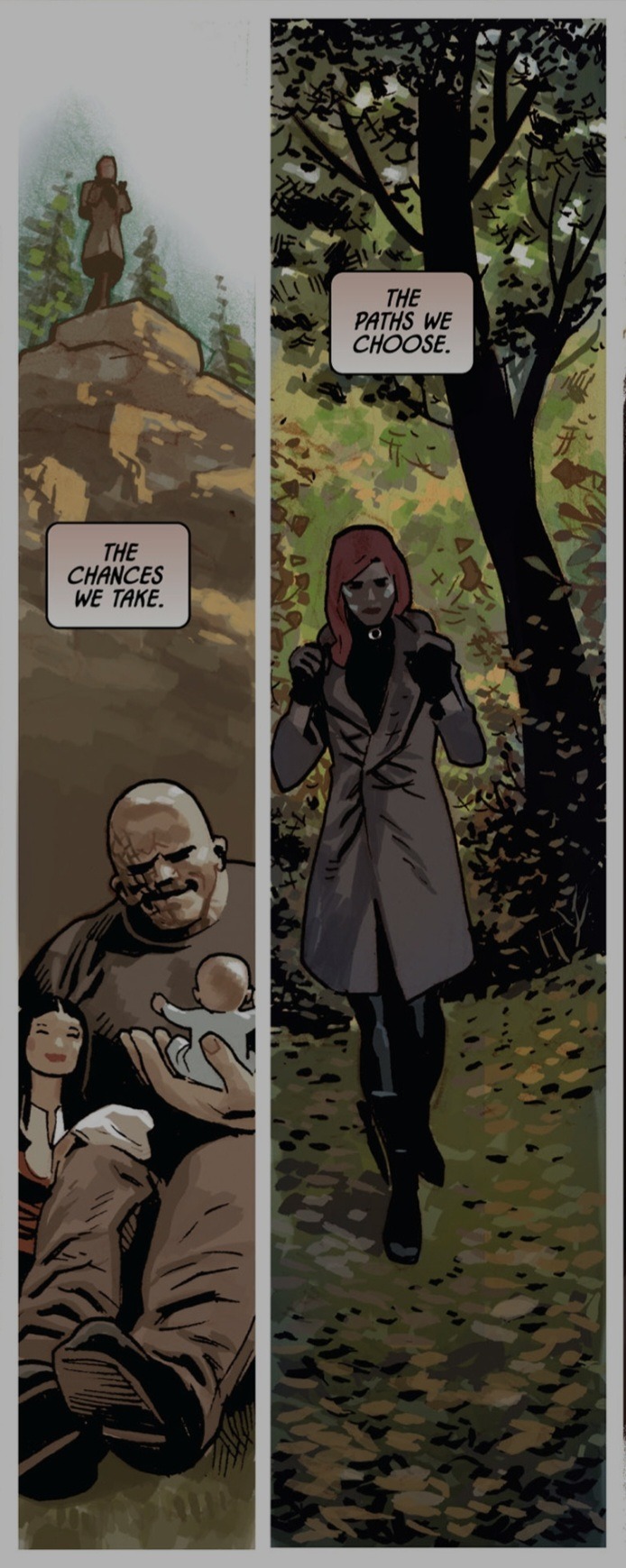
some of my fav outfits from the 2010 black widow: name of the rose comics, issues #1-5. written by marjorie liu and duane swierczynski
#comics#marvel#black widow#natasha romanoff#natasha romanov#marjorie liu#duane swierczynski#name of the rose#black rose#outfits tag
26 notes
·
View notes
Text
ajshdjka so I recently read The Name of the Rose and then watched the movie and Ive literally been hung up on how much I hated the movie and specifically on how much I disliked the way the canonically gay monks were treated?? and I feel crazy cause Ive literally not seen a single conversation about this but the way Berengar in particular was portrayed felt so gross to me ajhdsja I couldnt stand it. Like they made him so much weirder than in the book, took away all his lines and instead gave him a scene where he gets scared by a mouse and all the other monks laugh at him like some sort of freakshow??
#This one goes out to all my monk enjoyers I know I can`t be the only one#literally cannot stop thinking about how much the movie let me down#name of the rose
11 notes
·
View notes
Text
where is the Cadfael themed met gala. everyone dresses like a Benedictine monk from the 1100s who would for sure have been a Franciscan except the order wasn’t invented yet. where is Jeremy strong in a monk’s hood, freshly shaved tonsure, as if he has only just made the life-altering decision to become a man of the cloth. Everyone has a sprig of some herb behind their ear but it has to be an herb that Cadfael himself would have grown in his herbarium
#cadfael#ellis peters#dagger award#succession#kendall roy#the sopranos#adriana la cerva#kendall x stewy#succession hbo#real#tabitha#Cadfael pbs#slay#name of the rose#derek jacobi
27 notes
·
View notes
Text

They love each other so much. This was suchhhhh a good companion read after seeing the love that James has for Nat in the Winter Soldier run. I don't know why I didn't read this sooner.
43 notes
·
View notes
Text
Adso of Melk, writing his intro: I‘m not gonna bother describing people‘s appearances, this is my bare facts account of the case.
Adso three seconds later: William of Baskerville fucking rules and he‘s so hot and clever and I love his freckles. What was I saying? Oh right. Murder happened.
#name of the rose#already obsessed with 14th century Holmes and Watson here#bless them#Will of Baskerville is an adhd legend and a mood already
17 notes
·
View notes
Text
READ NAME OF THE ROSE PLAY PENTIMENT FREE YOUR MIND
#pentiment#umberto eco#name of the rose#book recommendation#i guess?#i want more people to consume these two pieces of media together
20 notes
·
View notes
Text
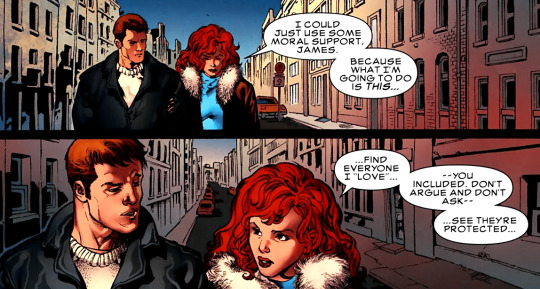
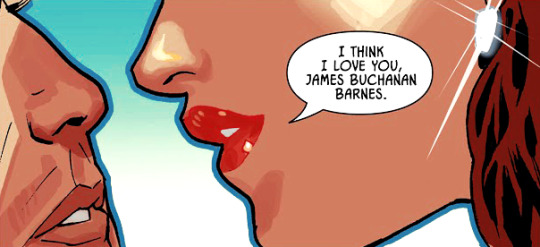
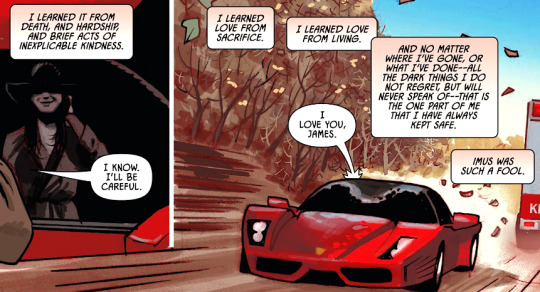
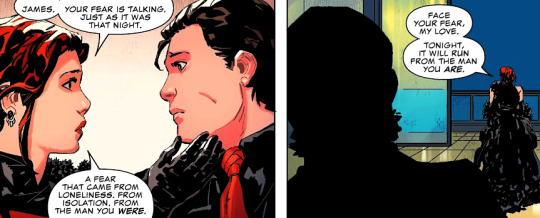
Black Widow: Deadly Origin (2009)
Black Widow: Name of the Rose (2010)
Thunderbolts (2023)
#comicedit#marveledit#buckynat#buckynatedit#natasha romanoff#bucky barnes#winterwidow#deadly origin#name of the rose#thunderbolts 2023#panels#my edits#losing my mind over buckynat parallels 🤪
188 notes
·
View notes
Text
Umberto Eco, I am in your walls.
"I realized, with a shudder, that at this moment these two men, arrayed in mortal conflict, were admiring each other, as if each had only acted to win the other’s applause. The thought crossed my mind that the artifices Berengar used to seduce Adelmo, and the simple and natural acts with which the girl had aroused my passion and my desire, were nothing compared with the cleverness and mad skill each used to conquer the other, nothing compared with the act of seduction going on before my eyes at that moment, which had unfolded over seven days, each of the two interlocutors making, as it were, mysterious appointments with the other, each secretly aspiring to the other’s approbation, each fearing and hating the other"
The detective and the murderer (both 14th-century monks) confronting each other and this is how you choose to describe it.
3 notes
·
View notes
Text
I dunno why I'm surprised when I start reading a book only to discover it's Sherlock Holmes again. This time he's a monk.
2 notes
·
View notes
Text
William of Baskerville is basically Sherlock.
6 notes
·
View notes
